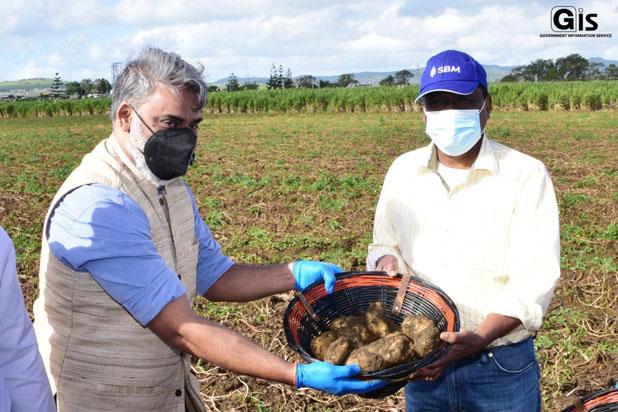Africa-Press – Mauritius. The floor price for Grade 1 Potatoes has been increased by Rs 2000 to reach Rs 27,500/T. Last year the price stood at 25,500/T. This is expected to bring significant relief to local producers.
The announcement was made, today, by the Attorney General, Minister of Agro-Industry and Food Security, Mr Maneesh Gobin, in Labourdonnais, Mapou, where he officially launched the 2021 Potato Harvesting season for the reaping of local potato produce, especially the variety ‘Spunta’, which is favoured by Mauritians.
The Minister of Arts and Cultural Heritage, Mr Avinash Teeluck, the General Manager of the Agricultural Marketing Board (AMB), Mr Gowkaran Oree, and other personalities, were also present.
In a statement, Minister Gobin said that the decision to increase the floor prices was taken by his Ministry in consultation with the AMB and the national potato committee mainly due to the rise in the cost of freight and increases of the exchange rate of the USD and in labour costs.
The Minister highlighted that, this year, the country was affected by torrential rains during the months of March and April and therefore the 2021 harvest will vary between 60 to 65%. The regions impacted by rain were La Marie, Glen Park, La Laura, St Pierre as well as the southern parts of Mauritius.
The production and quality of potatoes are still good and new varieties of potatoes such as the ‘Vigora’ developed by the Food and Agricultural Research and Extension Institute (FAREI) are also paying off, he stated.
In the coming days, said Mr Gobin, harvest will start in the regions of Glen Park, La Marie and Bigara where there are many potato planters. He expressed confidence that potato harvest will surpass the 70% mark in the coming years and the country will reduce its imports with agro-processing.
For him, Mauritius cannot continue to import 6000 to 6500 tons of frozen potatoes from other countries when these can be produced locally. As regards food security, the Minister said that both in terms of production and agro-processing, losses are incurred even before harvesting due to rain while after harvesting the vegetables produced deteriorate quickly as Mauritius is a tropical island.
However, there are agro-processing techniques which are very simple and can be adopted at home be it for potatoes, onions and tomatoes, he pointed out.
The Minister thus encouraged small businesses and individuals to learn these techniques at the FAREI Model Farms in Mapou, Wootun and Rivière des Anguilles.
These techniques, which aid in preserving foodstuffs for at least six months, are simple and do not require the use of chemical products, he emphasised.
This is how self-sufficiency is achieved and in periods of drought or heavy rainfall the need to import will not arise as individuals would have preserved what they would have produced some months back, he said.
Moreover, Mr Gobin recalled that as was announced last year by the Prime Minister, agro-processing has now become a pillar of the country’s strategy on food security.
He further informed that the onion harvest is scheduled this Saturday 24 July 2021 in the region of Trou-d’Eau-Douce. Addressing planters on the occasion, the Minister spoke of the need to reduce food wastage when producing.
Potato consumption amounts to 25 000/T per year with local production amounting to 11 000-12 000/T while the remaining is imported given that there are two seasons of production.
Citing a recent report of the United Nations Environment Programme, the Minister remarked that the low confidence estimates for Mauritius indicate that the food wastages for the country amount to nearly 100 000/T yearly.
These wastages occur in fields, are due to bacteria, and bad conservation, the latter which can be addressed by adopting simple agro-processing techniques, he added.
As for Mr Oree, he indicated that last year potatoes were bought from local planters at Rs 25,500/T and they have made representations that costs of production, labour, herbicides and fertilizers have increased that is why the floor price has been increased by Rs 2000.
This is expected to increase local production and at the same time we are maintaining the price of potatoes to protect both consumers and planters, he stated.







